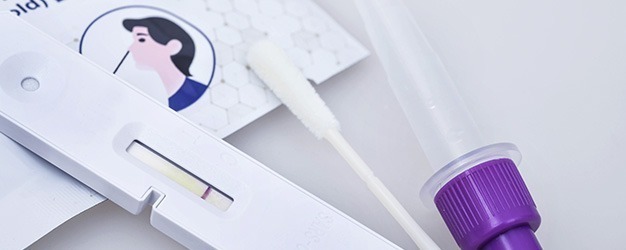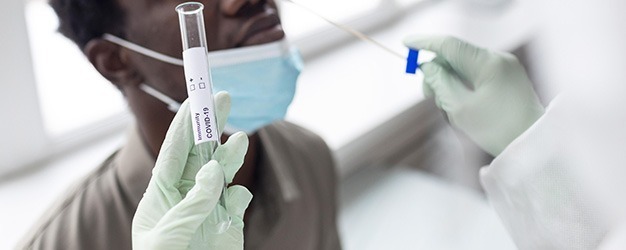Insights > Client Alerts
Client Alerts
Life Sciences Newsletter No.10 – January 2022
9 de fevereiro de 2022

[vc_row][vc_column][vc_column_text]Check out our Life Sciences Newsletter for the month of January, which gathers information on recent regulation, news, and legal texts related to the health and agriculture sector in Brazil.
This newsletter is generic and informative, and does not constitute a legal opinion for any specific operation or business. For more information, contact our team.
Enjoy reading!
Demarest Life Sciences Team
Read the ninth issue here.
[/vc_column_text][vc_empty_space height=”50px”][/vc_column][/vc_row][vc_row][vc_column][vc_column_text]Legislation[/vc_column_text][vc_empty_space height=”30px”][vc_column_text]
ANVISA – National Health Surveillance Agency
Anvisa regulates the use of self-tests for Covid-19
On January 28, 2022, the Brazilian National Health Regulatory Agency (ANVISA) approved Resolution – RDC No. 595, of January 28, 2022 (“RDC No. 595/2022”), which provides for the requirements and procedures for requesting registration, distribution, marketing and use of medical devices for in vitro diagnostics as a self-test for the detection of the SARS-CoV-2 antigen, in line with the National Plan for Expansion of Testing for Covid-19.
The approval allows the sale of self-tests directly to the consumer through licensed establishments (such as pharmacies). However, this marketing will not be carried out immediately, and companies must register the product before the Agency prior to commencement of sales.
Among the requirements of RDC No. 595/2022 are: (i) the need for clarity in the instructions for use; (ii) have a customer service channel; and (iii) the requirement for the external label to contain all kit components.
In addition, there should be post-marketing monitoring through a local health oversight portal, to verify if procedures are being followed, if there are adverse events and complaints, among other factors.[/vc_column_text][vc_empty_space height=”50px”][vc_column_text]
ANVISA – National Health Surveillance Agency
Self-test for Covid-19 without registration is prohibited
On January 31, 2022, Anvisa published three resolutions that prohibit the immediate sale of self-tests for Covid-19.
Resolutions 280/2022, 281/2022 and 282/2022 are intended for specific drugstores and encompass the Agency’s understanding that such product has not yet been regularized with ANVISA, and should not be sold in drugstores and pharmacies.
Until the official regularization, the distribution and marketing of the self-test was suspended, in accordance with all the norms of good pharmaceutical practices and sanitary control.[/vc_column_text][vc_empty_space height=”50px”][vc_column_text]
ANS – National Supplementary Health Agency
ANS approves the inclusion of a rapid test for the diagnosis of Covid-19 in the list of mandatory coverage
Normative Resolution RN No. 478, of January 19, 2022 (“RN No. 478/2022”) was published on January 19, 2022, which provides for the List of Procedures and Events in Health in the line of Supplementary Health, to regulate mandatory coverage and use of the SARS-CoV-2 Test (Coronavirus COVID-19), a rapid test for antigen detection.
Therefore, health plan operators will have to cover the rapid test for beneficiaries with outpatient, hospital or referral segmentation.
The National Supplementary Health Agency (ANS) recommends that the beneficiary clarify all possible doubts with its operator and encourages the entire population to perform the test when the respective symptoms are present.[/vc_column_text][vc_empty_space height=”50px”][vc_column_text]
ANS – National Supplementary Health Agency
ANS changes rules on the monitoring of healthcare assistance risk involving health plan operators
On February 02, the National Supplementary Health Agency (ANS) published Normative Resolution No. 479, of January 27, 2022 (RN No. 479/2022) and Normative Instruction No. 58, of January 26, 2022 (IN No. 58/2022), which establish rules regarding the Monitoring of Healthcare Assistance Risk for health plan operators, as well as the administrative measures to be imposed in the event that healthcare assistance risk is identified in operators of health plans.
The resolutions in question repealed Normative Resolution No. 416/2016 and Normative Instruction No. 49/2016, which had established rules on the same topic.
The resolutions present a new definition of “Monitoring of Healthcare Assistance Risk” as concerning: the periodic monitoring of health plan operators based on indicators that analyze the regularity of assistance, as well as actuarial, structural and operational aspects of their products, in order to identify signs of abnormalities and to preserve the continuity and quality of healthcare. Accordingly, the Monitoring of Healthcare Assistance Risk will be carried out based on the analysis of the results from health operators’ monitoring programs, carried out by the Directorate of Product Standards and Qualification (“DIPRO”) through the Mapping of Healthcare Assistance Risk and the Monitoring and Assessment of the Service Guarantee.
In turn, IN 58/2022 details the Mapping of Healthcare Assistance Risk program (methodology and disclosure of results), and establishes that those operators (a) classified in the modality of benefit administrator; (b) in the process of deregistration; or (c) that have no beneficiaries in the assessment quarter[1], will not be subject to the program.
According to the new Resolution, the application of any administrative measures will depend on a technical analysis of the operator’s specific situation and such measures may be applied without prejudice to the provisions contained in Normative Instruction No. 48/2015, which governs the monitoring and assessment of the service guarantee for beneficiaries by healthcare plan operators. Moreover, ANS may use criteria arising from its technical discretion to adopt other administrative or less burdensome measures than those provided for in NR. 479/2022.
[1] The reference period for indicators and results of the Mapping of Healthcare Assistance Risk.[/vc_column_text][vc_empty_space height=”50px”][/vc_column][/vc_row][vc_row][vc_column][vc_column_text]News[/vc_column_text][vc_empty_space height=”30px”][vc_column_text]
TJ/SP – Court of Appeals of the State of São Paulo
Compounding pharmacies may use cannabis derivatives, according to the Court of Appeals of the State of São Paulo
The decision of the 2nd Public Treasury Court of São José do Rio Preto, which prevented restrictions on a compounding pharmacy for the production of drugs based on cannabis sativa, was upheld by the 1st Chamber of Public Law of the Court of Appeals of São Paulo, through Appeal No. 1034060-68.2021.8.26.0576, on January 17, 2022.
The Municipal Health Regulatory Agency had imposed restrictions on the product supported by an ANVISA resolution, which prohibits the use of this compound in the manufacture of medicines. However, judge Rubens Rihl, responsible for the decision, argued that there is no discrimination between drugstores and compounding pharmacies in terms of activity, and there should be no further restriction on compounding pharmacies.
With this decision, the local health authority must refrain from imposing restrictions on authorization or operation for pharmacies that manufacture products based on the compound.[/vc_column_text][vc_empty_space height=”50px”][vc_column_text]
ANVISA – National Health Surveillance Agency
Anvisa approves new Cannabis-based products
ANVISA approved, on July 1, 2022, the tenth Cannabis-based medicinal product for the Brazilian population, the “cannabis sativa greencare extract 79.14 mg/ml”, through Resolution-RE No. 136, of January 17, 2022 (“RE 136/2021”).
As a result, the list of products contained in Collegiate Board Resolution (RDC) 327/2019 (“RDC No. 327/2019”) was updated, totaling ten products approved since the Rule was issued.[/vc_column_text][vc_empty_space height=”50px”][vc_column_text]
ANVISA – National Health Surveillance Agency
Anvisa provides directory of drug labels
On January 21, 2022, the searchable directory of updated labels of medicines registered by ANVISA was made available, in accordance with the Agency’s decision.
Companies will be able to register the labels of their products already registered by means of a request, attaching the necessary documents on the Agency’s website.
The consultation of drug labels can be done via this link, applying at least one of the suggested filters provided in the search field.[/vc_column_text][vc_empty_space height=”50px”][vc_column_text]
ANS – National Supplementary Health Agency
ANS discloses operator performance results in base year 2020
On January 6, 2022, the ANS disclosed the results of the Supplementary Health Insurance Performance Index (IDSS) 2021, base year 2020, which reflects the operators’ performance in the Operational Qualification Program (PQO)..
Despite the ongoing pandemic, the methodology was not changed and the program was not suspended and, according to the Agency itself, it is an important instrument for demonstrating the sector’s performance in a transparent and accurate way.
The index can be consulted through this link.[/vc_column_text][vc_empty_space height=”50px”][/vc_column][/vc_row][vc_row][vc_column][vc_column_text]Public Consultations and Hearings[/vc_column_text][vc_empty_space height=”30px”][vc_column_text]
ANS – National Supplementary Health Agency
ANS opens public consultation on updating mandatory coverage
On January 28, 2022, Public Consultation – CP No. 91 was opened by the ANS, which aims to receive various contributions to update and review the list of coverages by health plans.
The Public Consultation deals with the inclusion of the drugs darolutamide, regorafenib, dupilumab and ustekinumab (recommended for treatment of, respectively: prostate cancer, colorectal cancer, asthma, and colitis) in the list of health plans and also opens for participation by the public the Preliminary Reports resulting from the 1st technical meeting of the Commission for Updating the List of Procedures and Events in Supplementary Health (COSAÚDE) .
Interested parties must make their contributions between January 28, 2022 and February 16, 2022, sending the form through this link.[/vc_column_text][vc_empty_space height=”50px”][/vc_column][/vc_row]
Áreas Relacionadas














